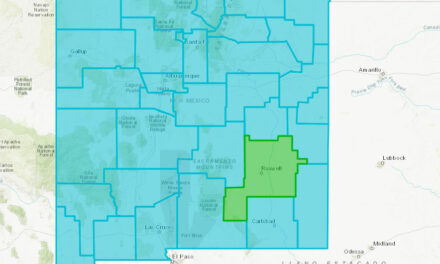SANTA FE — Thirty cities and counties in New Mexico are suing Gov. Michelle Lujan Grisham’s administration, alleging the state is illegally billing them to backfill the deficit in a health benefits fund.
In two lawsuits, the city and county governments say they have been hit with an unexplained, unconstitutional bill exceeding $18 million altogether.
The dispute centers on the state fund that handles group health insurance for about 57,000 individuals, such as government employees and their families.
The fund has run up a deficit of $149 million over the years as the state General Services Department refused to raise premiums while healthcare costs climbed amid the COVID-19 pandemic, according to state and court documents.
The department last increased premiums in 2019. A spokeswoman for Lujan Grisham said the governor has sought to reduce the financial stress on employees.
But city and county governments say it’s improper to now stick them with so much of the bill. They paid the premiums the state set each year, the governments say, and it’s illegal to seek extra payments now.
Officials in the General Services Department, which oversees the health benefits fund, contend they are simply carrying out a directive included in budget legislation approved this year.
The city and county lawsuits — each filed in the 7th Judicial District — accuse the governor and Legislature of illegally trying to use budget legislation to force local governments to pay a new “assessment” to bolster the group health fund.
The annual spending package passed by state lawmakers and signed by Lujan Grisham this year called for local governments that participate in the health fund to make extra payments to help bridge the shortfall.
But the 24 counties, in their lawsuit, called the assessment language in the bill “incomprehensively vague.” The invoices sent to counties, likewise, had no explanation of how the assessment was calculated, the counties said.
In their own legal complaint, the six cities accused the state of illegally operating the health fund at a deficit for years despite requirements to maintain the fund in “actuarially sound condition.”
Both lawsuits contend the General Services Department’s attempt to charge the assessment violates state law and that attempting to use annual appropriations legislation to force the expense on them violates the state Constitution, which limits budget bills to spending, not raising assessments.
The cities said they could face damage to their credit rating because of the outstanding bills. And the consequences of not resolving the standoff could be tragic, they said.
“If GSD is to terminate insurance coverage for Plaintiffs’ employees because of nonpayment,” the cities contend, “thousands of employees will be adversely affected with potentially tragic consequences.”
The plaintiff cities include Socorro, Las Cruces, Moriarty, Estancia, Raton and Portales. They aren’t the only municipalities, however, facing the invoices.
Albuquerque and Bernalillo County, in any case, aren’t part of the group health insurance fund.
The city and county lawsuits each name General Services Secretary Robert Doucette Jr. — appointed by the governor to her Cabinet in February — as a defendant.
The city lawsuit also names GSD as a defendant, in addition to the state Healthcare Authority Department and the state government.
A GSD spokesman said Thursday he couldn’t comment on active litigation.



















